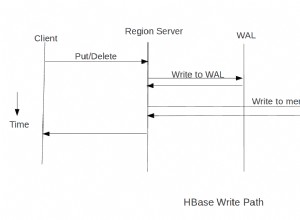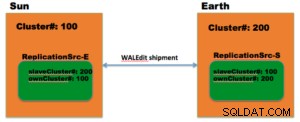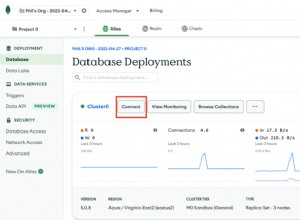यह नुस्खा एक HDFS उदाहरण से डेटा को MongoDB संग्रह में लोड करने के लिए MongoOutputFormat वर्ग का उपयोग करेगा।
Getting ready
Mongo Hadoop एडेप्टर के साथ आरंभ करने का सबसे आसान तरीका GitHub से Mongo-Hadoopproject को क्लोन करना और Hadoop के एक विशिष्ट संस्करण के लिए कॉन्फ़िगर किए गए प्रोजेक्ट का निर्माण करना है। इस प्रोजेक्ट को क्लोन करने के लिए एक Gitclient स्थापित किया जाना चाहिए। यह नुस्खा मानता है कि आप Hadoop के CDH3 वितरण का उपयोग कर रहे हैं। आधिकारिक Git क्लाइंट https://git-scm.com/downloads ।
Mongo Hadoop एडेप्टर GitHub पर https://github.com/mongodb/ पर पाया जा सकता है। मोंगो-हडूप। इस परियोजना को Hadoop के एक विशिष्ट संस्करण के लिए बनाया जाना चाहिए। परिणामी JAR फ़ाइल को $HADOOP_HOME/lib फ़ोल्डर में प्रत्येक नोड पर स्थापित किया जाना चाहिए। Mongo Java ड्राइवर को $HADOOP_HOME/lib फ़ोल्डर में प्रत्येक नोड पर स्थापित करने की आवश्यकता है। इसे https://github.com/mongodb/mongo-java-driver पर पाया जा सकता है / डाउनलोड ।
इसे कैसे करें...
Complete the following steps to copy data form HDFS into MongoDB:
1. Clone the mongo-hadoop repository with the following command line:
git clone https://github.com/mongodb/mongo-hadoop.git
2. Switch to the stable release 1.0 branch:
git checkout release-1.0
3. Set the Hadoop version which mongo-hadoop should target. In the folder
that mongo-hadoop was cloned to, open the build.sbt file with a text editor.
Change the following line:
hadoopRelease in ThisBuild := "default"
to
hadoopRelease in ThisBuild := "cdh3"
4. Build mongo-hadoop :
./sbt package
This will create a file named mongo-hadoop-core_cdh3u3-1.0.0.jar in the
core/target folder.
5. Download the MongoDB Java Driver Version 2.8.0 from https://github.com/
mongodb/mongo-java-driver/downloads .
6. Copy mongo-hadoop and the MongoDB Java Driver to $HADOOP_HOME/lib on
each node:
cp mongo-hadoop-core_cdh3u3-1.0.0.jar mongo-2.8.0.jar $HADOOP_
HOME/lib
7. Create a Java MapReduce program that will read the weblog_entries.txt file
from HDFS and write them to MongoDB using the MongoOutputFormat class:
import java.io.*;
import org.apache.commons.logging.*;
import org.apache.hadoop.conf.*;
import org.apache.hadoop.fs.Path;
import org.apache.hadoop.io.*;
import org.apache.hadoop.mapreduce.lib.input.FileInputFormat;
import org.apache.hadoop.mapreduce.lib.input.TextInputFormat;
import org.apache.hadoop.mapreduce.*;
import org.bson.*;
import org.bson.types.ObjectId;
import com.mongodb.hadoop.*;
import com.mongodb.hadoop.util.*;
public class ExportToMongoDBFromHDFS {
private static final Log log = LogFactory.getLog(ExportToMongoDBFromHDFS.class);
public static class ReadWeblogs extends Mapper<LongWritable, Text, ObjectId, BSONObject>{
public void map(Text key, Text value, Context context)
throws IOException, InterruptedException{
System.out.println("Key: " + key);
System.out.println("Value: " + value);
String[] fields = value.toString().split("\t");
String md5 = fields[0];
String url = fields[1];
String date = fields[2];
String time = fields[3];
String ip = fields[4];
BSONObject b = new BasicBSONObject();
b.put("md5", md5);
b.put("url", url);
b.put("date", date);
b.put("time", time);
b.put("ip", ip);
context.write( new ObjectId(), b);
}
}
public static void main(String[] args) throws Exception{
final Configuration conf = new Configuration();
MongoConfigUtil.setOutputURI(conf,"mongodb://<HOST>:<PORT>/test. weblogs");
System.out.println("Configuration: " + conf);
final Job job = new Job(conf, "Export to Mongo");
Path in = new Path("/data/weblogs/weblog_entries.txt");
FileInputFormat.setInputPaths(job, in);
job.setJarByClass(ExportToMongoDBFromHDFS.class);
job.setMapperClass(ReadWeblogs.class);
job.setOutputKeyClass(ObjectId.class);
job.setOutputValueClass(BSONObject.class);
job.setInputFormatClass(TextInputFormat.class);
job.setOutputFormatClass(MongoOutputFormat.class);
job.setNumReduceTasks(0);
System.exit(job.waitForCompletion(true) ? 0 : 1 );
}
}
8. Export as a runnable JAR file and run the job:
hadoop jar ExportToMongoDBFromHDFS.jar
9. Verify that the weblogs MongoDB collection was populated from the Mongo shell:
db.weblogs.find();




